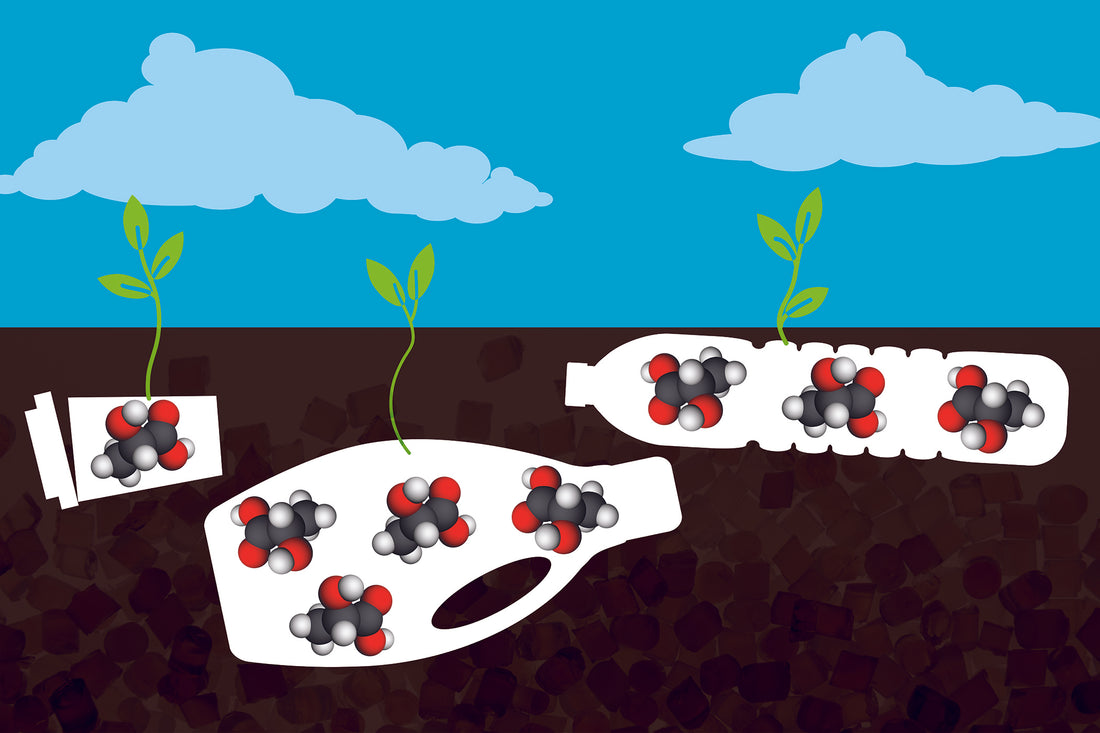
Bioplastics: No Panacea
By: Jim Clugger
Bioplastics have been marketed as safer and more environmentally friendly food packaging and serving materials compared to petroleum-based plastics. They are often used in single-use coffee cups, tea bags, food trays, utensils, and reusable cups.
Rather than the cure-all that was proffered, upon closer inspection, bioplastics appear to be a regrettable substitution for conventional plastics.
Research shows that bioplastics suffer from toxicity and negative environment impacts like their petroleum-based counterparts.
In 2020, a cohort of 33 researchers released a consensus statement that they summarized as: “Current safety assessment of food contact chemicals is ineffective at protecting human health.”
This warning of a chronic global health crisis might have received more attention if it weren’t for a more acute and coincident global health disaster, the corona virus pandemic, which ironically increased single-use packaging in food contact applications.
According to the cohort, “Approximately 12,000 intentionally added substances and 30,000 to 100,000 non-intentionally added substances potentially migrate into food from various food contact articles.” The concentrations of contact chemicals in foods exceed the concentrations of pesticides in food by a factor of at least 100 and the health effects of almost all of them are unknown.
Among these chemicals are those from bioplastics.
A toxicological study of bioplastics by Zimmermann et al. in 2020 identified 343 chemical compounds in everyday product made from bioplastics, with other chemical compounds unidentifiable. The study showed toxicity in 78% of everyday products made from bioplastics.
The bioplastics study included many common bioplastics like polyethylene (Bio-PE), polyethylene terephthalate (Bio-PET), polybutylene adipate terephthalate (PBAT), polybutylene succinate (PBS), polylactic acid (PLA), polyhydroxyalkanoates (PHA) and bamboo-based materials, which are often touted as better for the environment with implied marketing of reduced toxicity compared to conventional plastics.
However, the authors conclude that “bio-based and/or biodegradable materials available on the market are just as toxic as conventional plastics.”
The environmental benefits of bioplastics are being called into question as well.
In a 2021 literature review by Gerassimidou et al., which considered the introduction of bioplastic substitutes for conventional petroleum-based plastics and the potential impacts on the environment and other societal concerns, they found that bioplastics are worse for the environment across all environmental impact categories.
The authors considered a “whole system approach” to holistically assess the environmental consequences of switching from conventional plastics to bioplastics in the areas of global warming potential, land use change, ecosystem degradation, fuel depletion, eutrophication, and acidification.
The main cause of the increased negative impacts is the production of the agricultural feedstock for the bioplastics. Replacing conventional plastic with bioplastic would require a land mass approximately the size of Greenland. Such agricultural land use would require huge amounts of water, fertilizer, pesticides, and energy. The land use change would result in global warming, biodiversity loss, and water eutrophication.
Consumers wishing to minimize their exposure to food contact chemicals from bioplastics or conventional plastics can choose materials that are less likely to transfer chemicals to their food, like glass.
Reusable cups and food ware, particularly those that don’t contain plastic, help to prevent the negative environmental impacts of bioplastic production and waste.
Our role at VITRI, besides presenting information like contained in this article, is to provide products that are designed and engineered to be better for the environment and human health. We are eager to present consumers with a better alternative to plastic products: reduced environmental impact, chemical-free conviviality, and an overall better experience, which is why we developed the VITRI™ Tumbler.
The VITRI Tumbler is an on-the-go mug that eliminates synthetic materials like plastic, rubber, and silicone from the drinking experience by employing a patented glass seal.
We believe the VITRI Tumbler is a substantive contribution to an enhanced culinary experience fully capable of providing the convenience and sustainability that will consign the concept of disposable plastics to the garbage heap of history.
Editor's Note: This post has been updated to reflect our rebranding to VITRI.
